
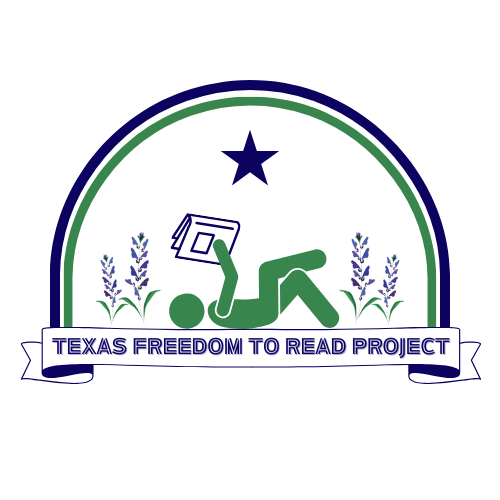
A comment on a recent post made me realize that some of my Substack readers don’t know about the Texas Freedom to Read Project, the non-profit I helped start with two other Texas parents, Anne Russey and Laney Hawes, in December of last year. So I thought I’d take some time to introduce the project here and talk about our goals, the way we work, and the things we’ve done so far.
Here’s what you need to know about the Texas Freedom to Read Project:
First: It’s our 6-month birthday.
We officially launched on December 4, 2023, with this press release. Send us cake!
Second: We’re as grassroots as it comes.
I’m just a teacher who sometimes writes on the internet, so it’s been a little crazy to me to see just how much leverage has come from Laney, Anne and I combining our efforts. We’ve been quoted in The Guardian, The Nation, The Texas Tribune, NPR, The American Prospect, and news sites all around Texas. Our work has been noticed because we’ve been doing big things. But we really are just three people—with lots of allies and supporters—who are deeply committed to our kids’ educations, and to the rights of all Texans.
Third: Our mission is to support, connect and mobilize parent- and community-led initiatives fighting for student rights and against censorship and book bans in Texas.
What does that mean?
It means that we uncover and publicize information regarding book removals in schools and public libraries, we train and organize parents to speak up at school board meetings and legislative committees, and we amplify the voices of those affected by book bans.
While we’re not afraid of a confrontation, we try to bring thoughtfulness and consideration to book debates: to slow things down (calm is a form of resistance), to argue from facts and the law, to be right in what we write. And we try to center our work in the communities we’re trying to help, to provide support for the affected parties in a given district while letting them take the lead, and to bring as many groups together as we can to fight the censorship that’s affecting us all.
We’ve partnered with incredible local, statewide, and national groups that focus on fighting censorship, advocating for student and parent rights, support for libraries, librarians, and public schools. Those groups include the ACLU, Children’s Defense Fund, EveryLibrary, PEN America, Students Engaged in Advancing Texas, Authors Against Book Bans, Defense of Democracy, and FReadom Fighters. And we’re deeply grateful to our mentors at the Florida Freedom to Read Project, who have completely changed the conversation around books in that state, and whom we shamelessly copy in everything that we do.
You can see an example of how we work in our fight to save four library book purchases in La Grange this February. For background: A trustee in conservative La Grange ISD had flagged Class Act by Jerry Craft, Can I Touch Your Hair by Irene Latham, Finally Seen by Kelly Yang, and Eyes of the Forest by April Henry, which were scheduled to be purchased by the district. Though the trustee hadn’t read the book, he said that the books had been challenged or removed from other districts around the country, and said “I am really frustrated that we may potentially be letting more filth in when we haven’t taken the stuff out that is there right now.”
It was a perfect example of the extremes to which book-banning fervor can lead: none of those books could remotely be described as sexually explicit, pervasively vulgar, or educationally unsuitable, but here they were being challenged on the basis of rumor and hearsay rather than a careful consideration of the text.
Kelly Jensen, who writes for BookRiot.com and is one of the nation’s top anti-censorship advocates, notified us about the challenge to the books’ purchase. We immediately started strategizing by text message, and Laney reached out to locals who were upset about the attempted censorship. We checked with Texas FReadom Fighters to see if they knew any librarians in the district. We also informed our friends at Authors Against Book Bans—they contacted April Henry, one of the authors under attack. Henry wrote a letter to each member of the board as well as the local newspaper; so did several local citizens, parents, and educators. And it worked. The board ultimately voted to purchase the books.
We do similar work all around Texas. We’re always ready to fight for the freedom to read—district by district, book by book if we have to.
But we’re also trying to identify trends and statewide concerns so that we don’t necessarily have to fight district by district. To that end, we sent guidance in May (with our partners at SEAT, AABB, and Children’s Defense Fund) to every superintendent and trustee in the state to help implement the new TSLAC standards that were adopted by the State Board of Education in January in compliance with HB900. We did this because we had noticed districts going beyond the requirements of the law—and sometimes acting in violation of the law—to remove books after receiving pressure from activists in Citizens Defending Freedom or the Remnant Alliance. Our letter highlighted the actual requirements of HB900 and let district leaders know that there are risks to removing books, too, that range from legal challenges, to educator dissatisfaction and turnover, to diminished educational opportunities for students.
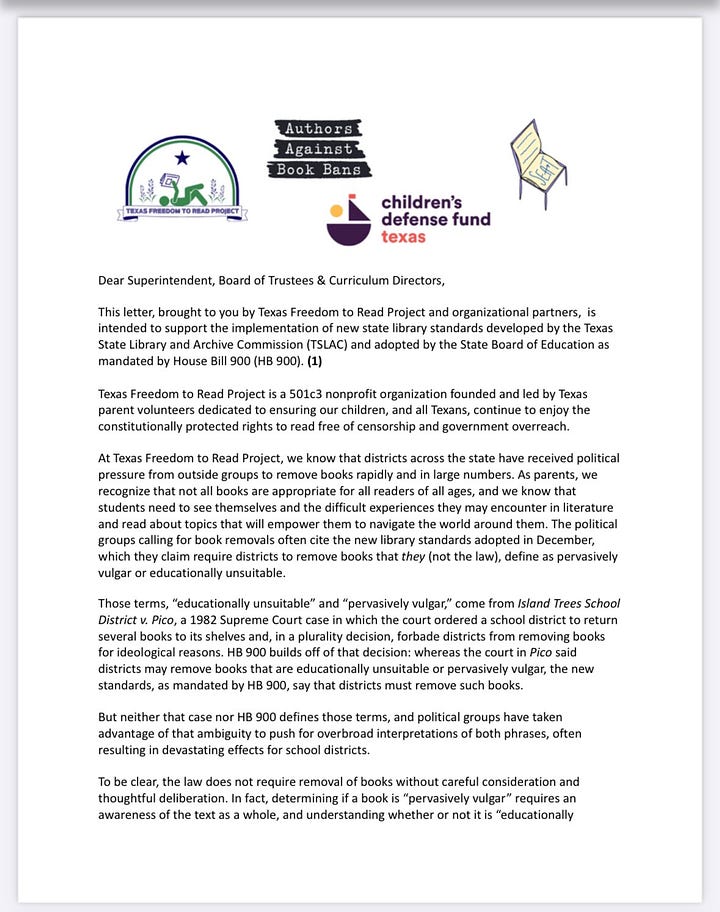
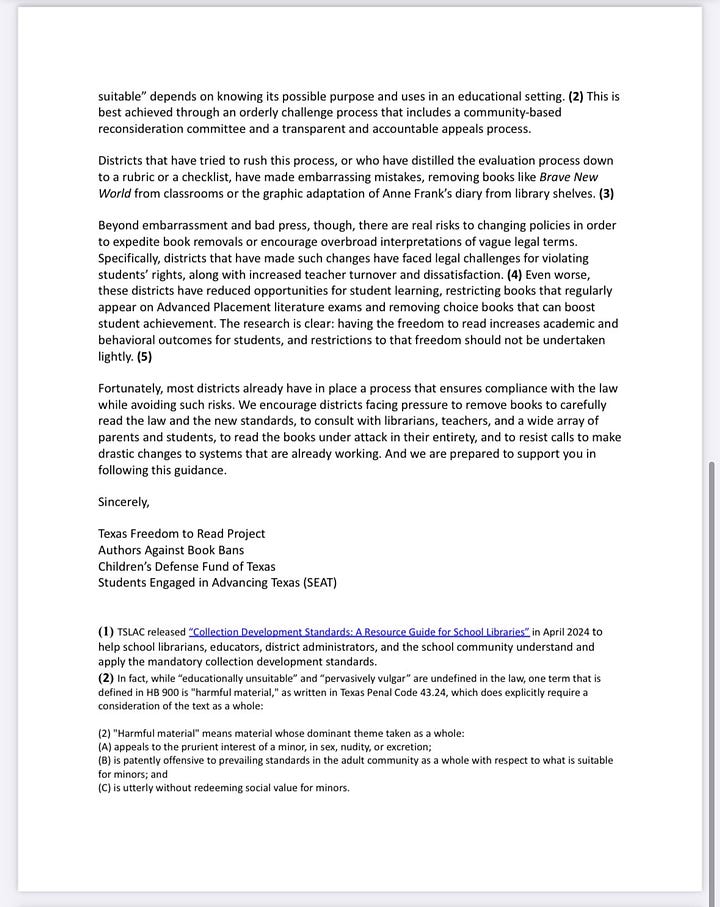
Our hope was that this guidance could be used not only by district leaders, but also by regular people who want to push back against the Christian nationalists trying to take books out of the hands of Texas students. And that’s exactly what happened in Harlingen ISD. Members of the Christian nationalist Remnant Alliance tried to pressure the Harlingen board to remove more than 600(!) books from district schools. A retired teacher used our letter to explain to her school board the many reasons that was a bad idea.
Here are a few more of our efforts that make me especially proud:
We’ve publicized research on the importance of the freedom to read, and the value that the books being challenged across Texas (and the US) can bring to young readers.
We’ve documented the effects of a variety of policy changes in Texas schools, including restrictions on book orders in Katy ISD and librarian layoffs in Spring Branch ISD.
We helped EveryLibrary put together the first in-depth statewide survey of Texas school board candidates on the issues of academic freedom and censorship, and we published a report on the trends that survey illuminated.
We donated hundreds of banned books for Defense of Democracy events that helped get out the vote in Fort Worth.
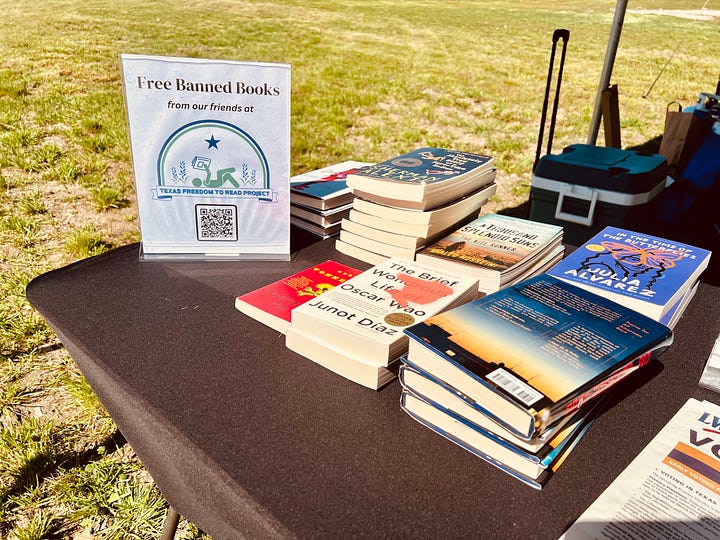

In short, we are working all the time to help fight censorship and stand up for books and public education. If you’re in Texas, we would love for you to join our efforts. Or let us know how we can help you! If you’re reading this from elsewhere, we hope our work can help you fight for the freedom to read in your state. Just like the Florida Freedom to Read Project has been a model to us, we hope to be model for smart, effective action in other states. Either way, please check out our website and follow us on Twitter or Instagram for updates.




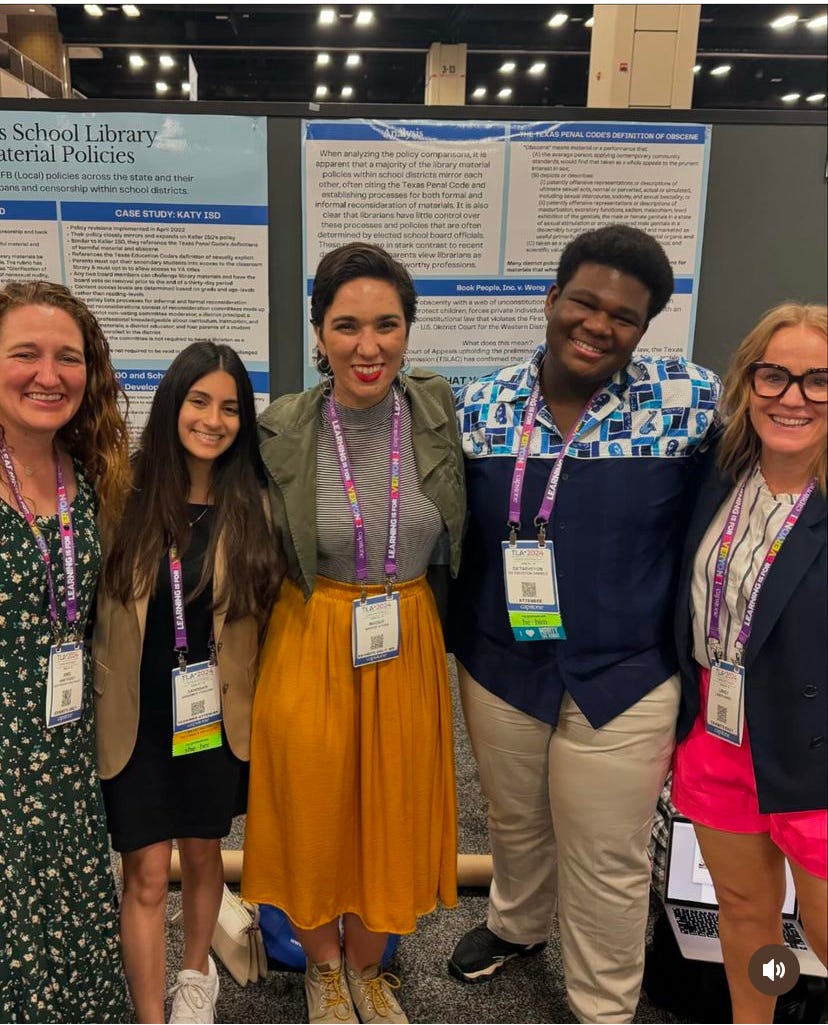
Happy six month anniversary!